
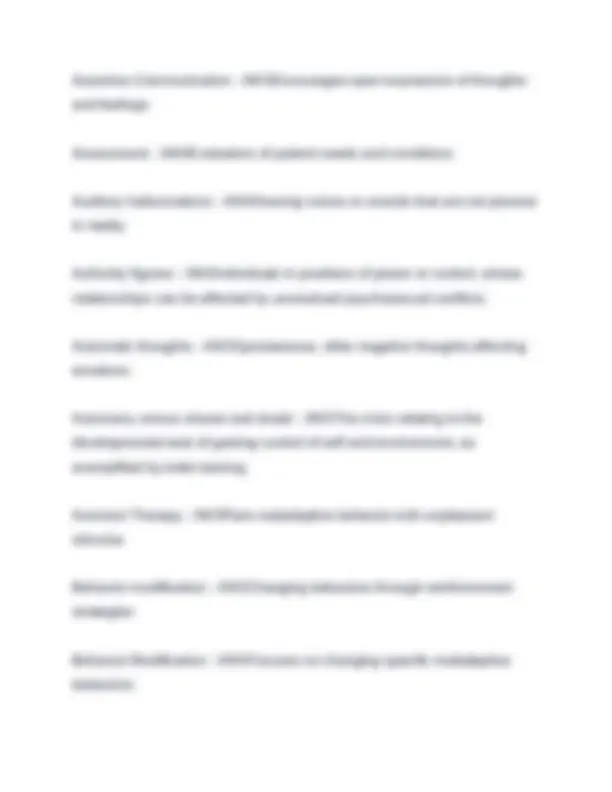
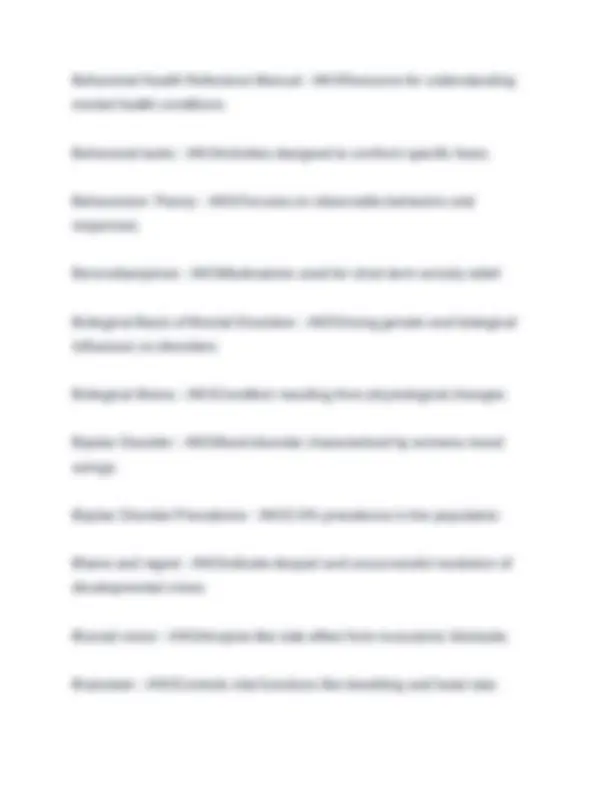
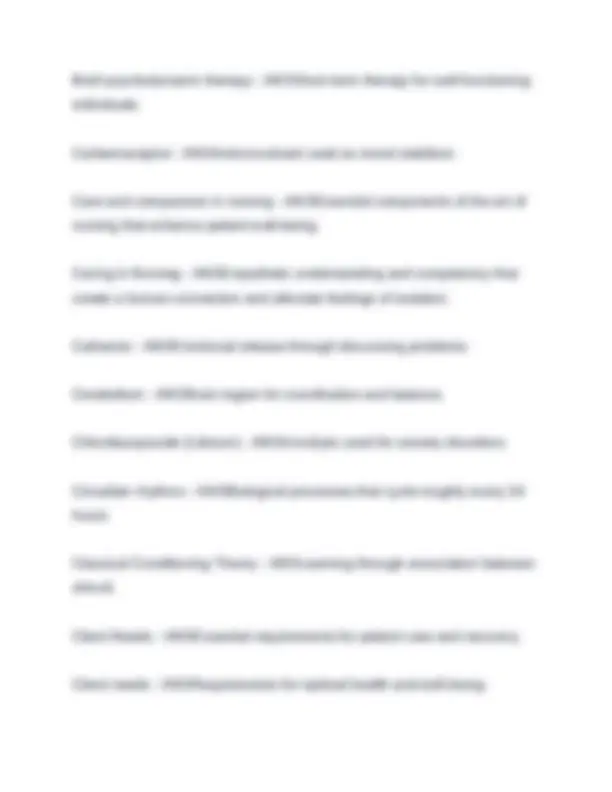
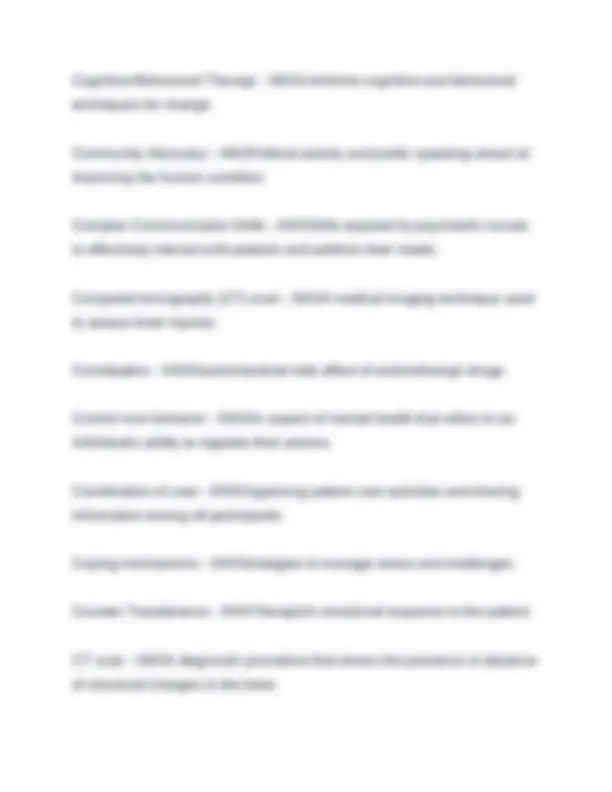
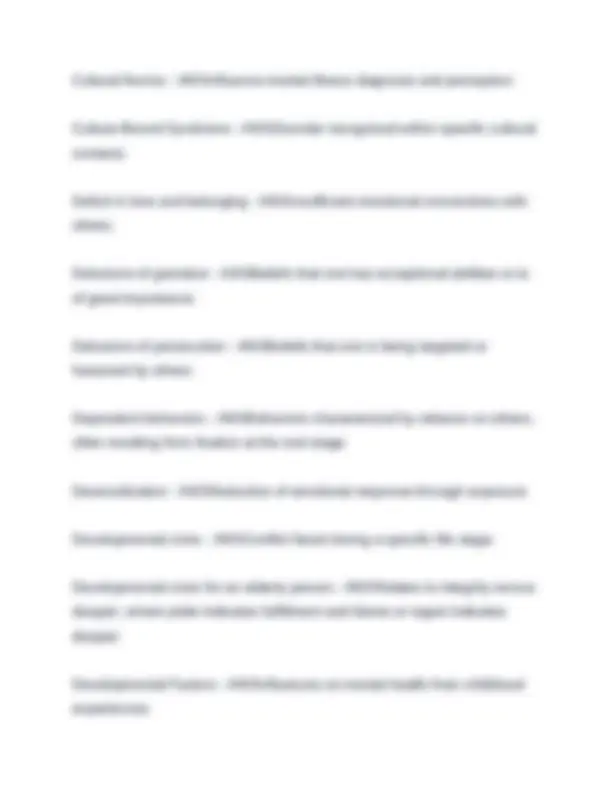
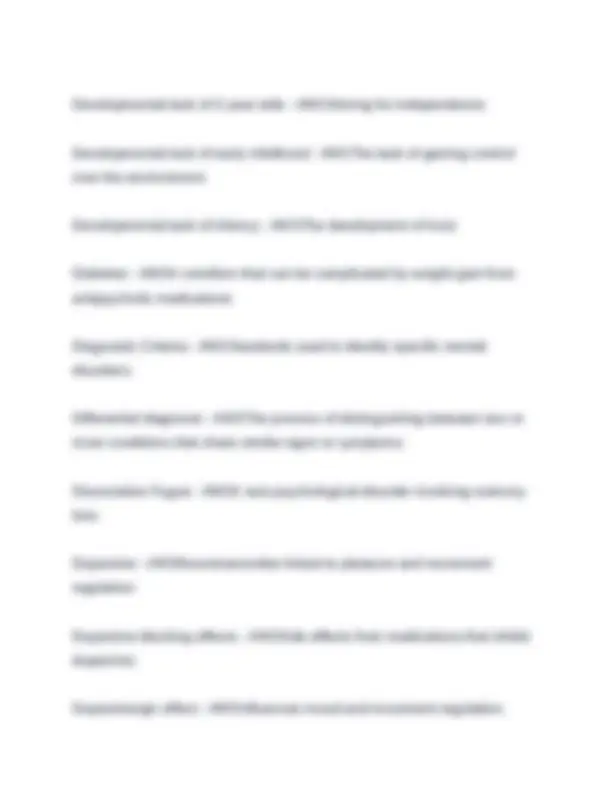
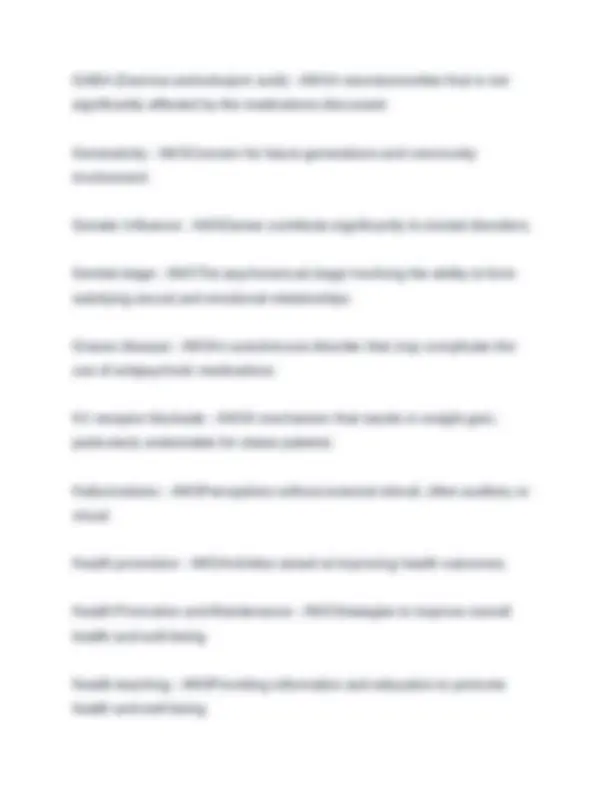
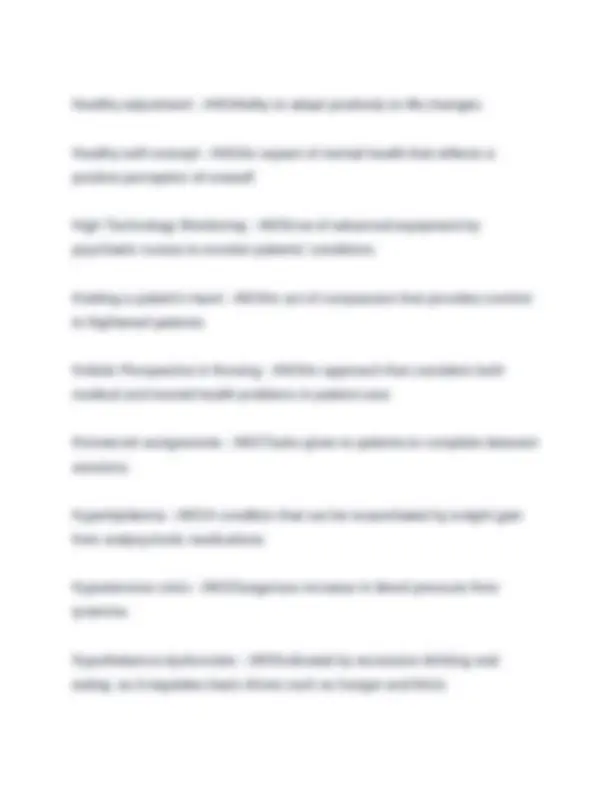
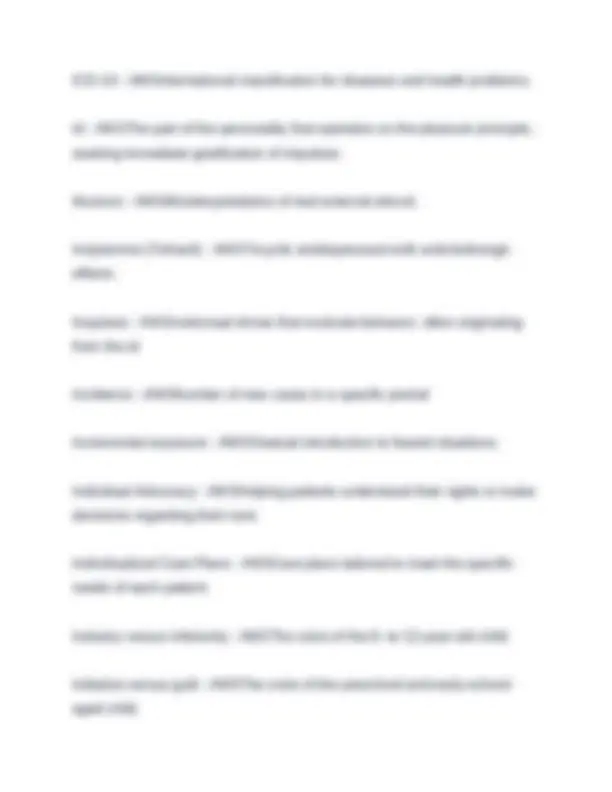
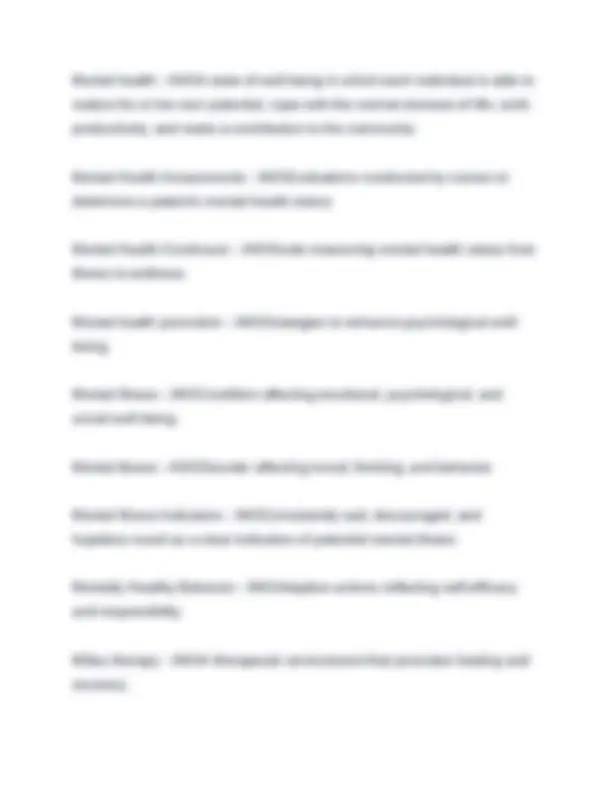
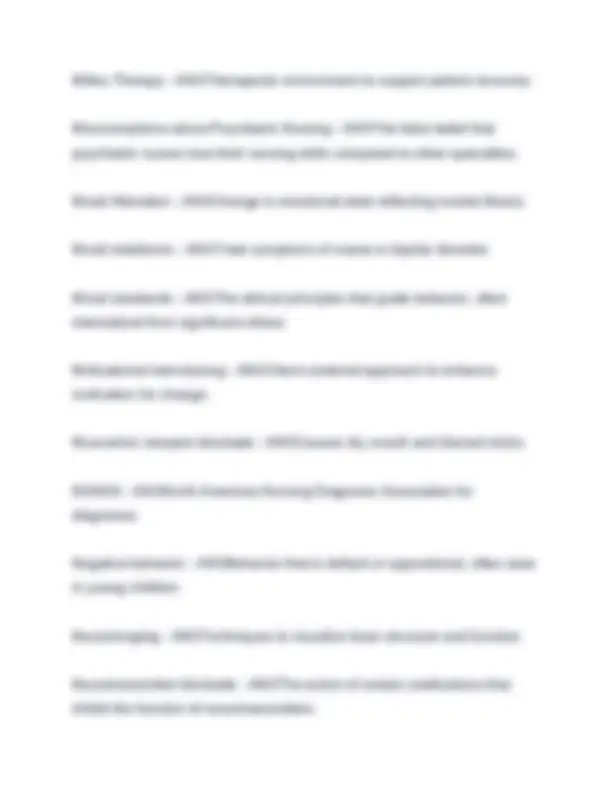
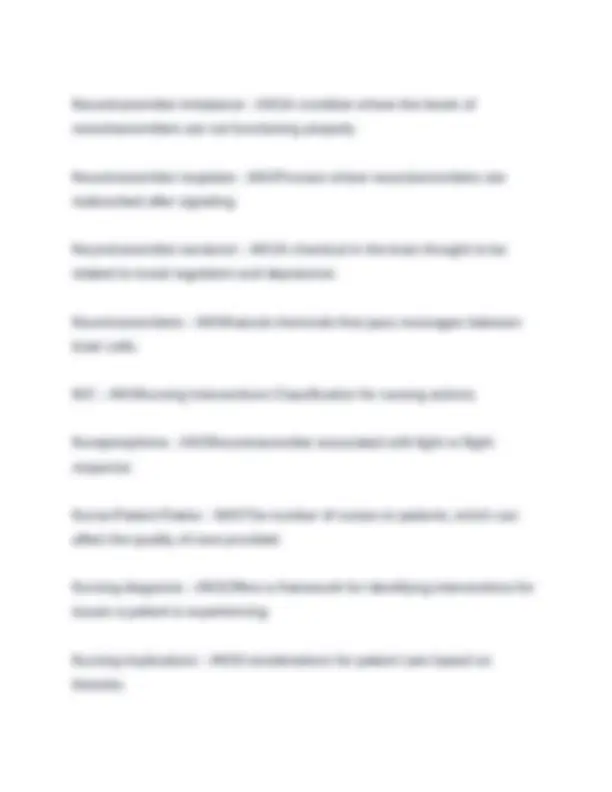
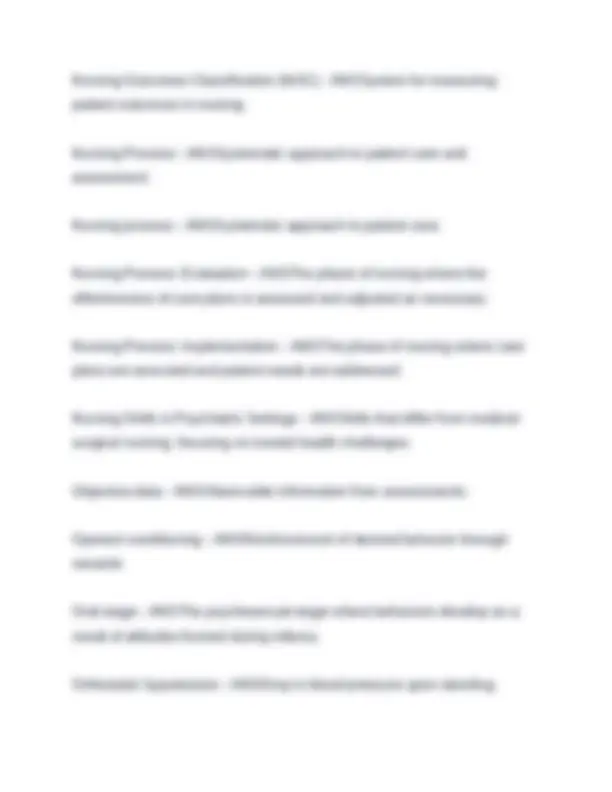
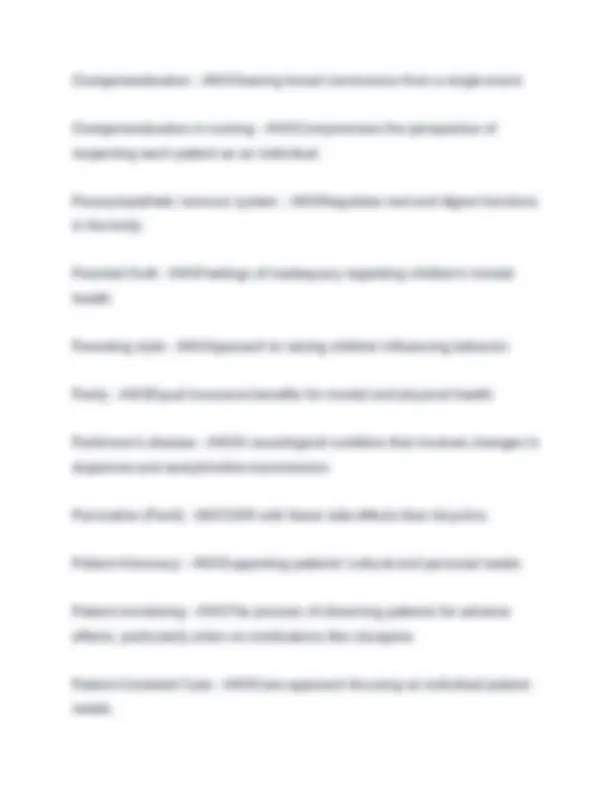
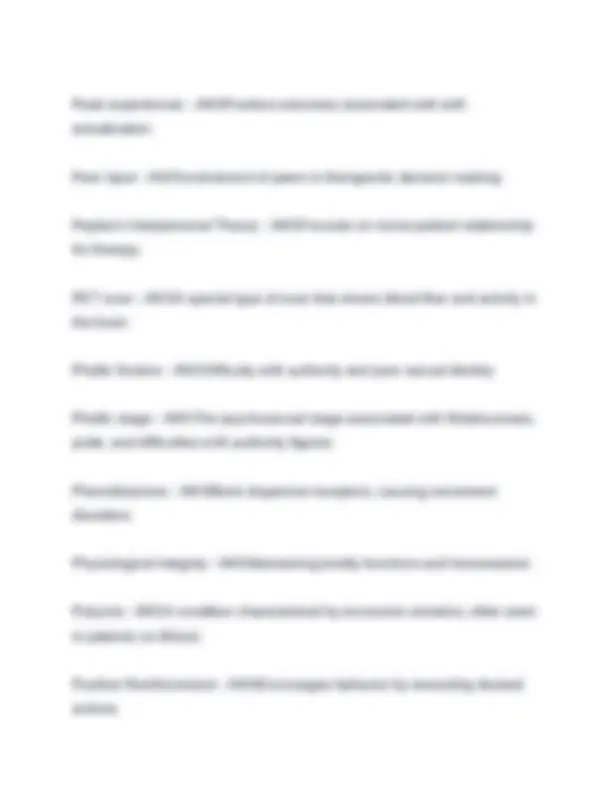
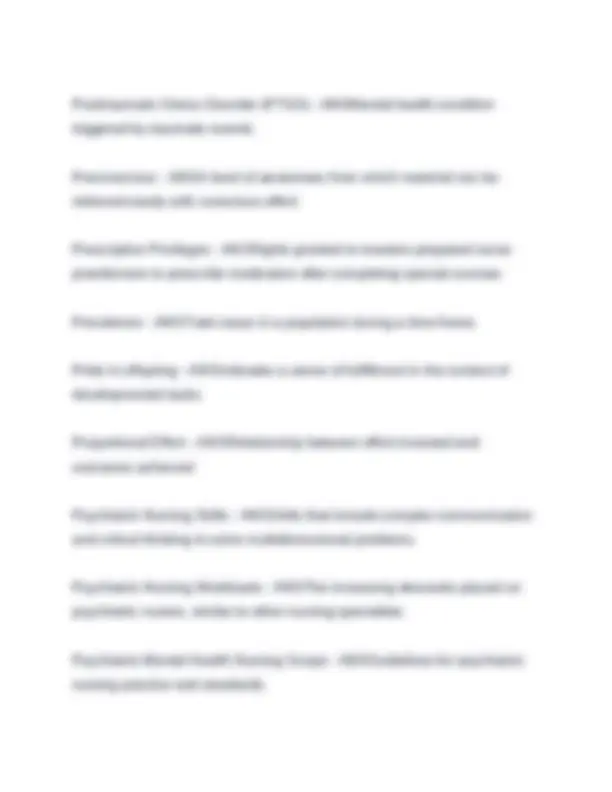
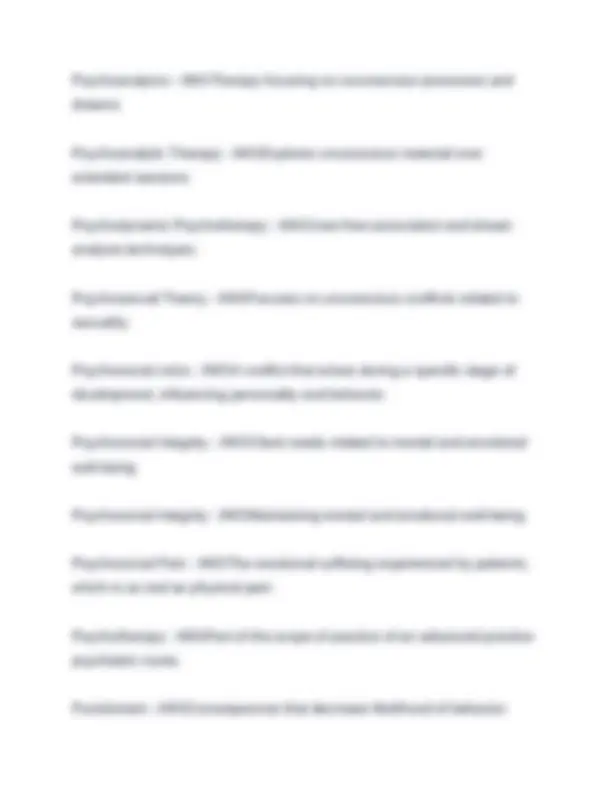
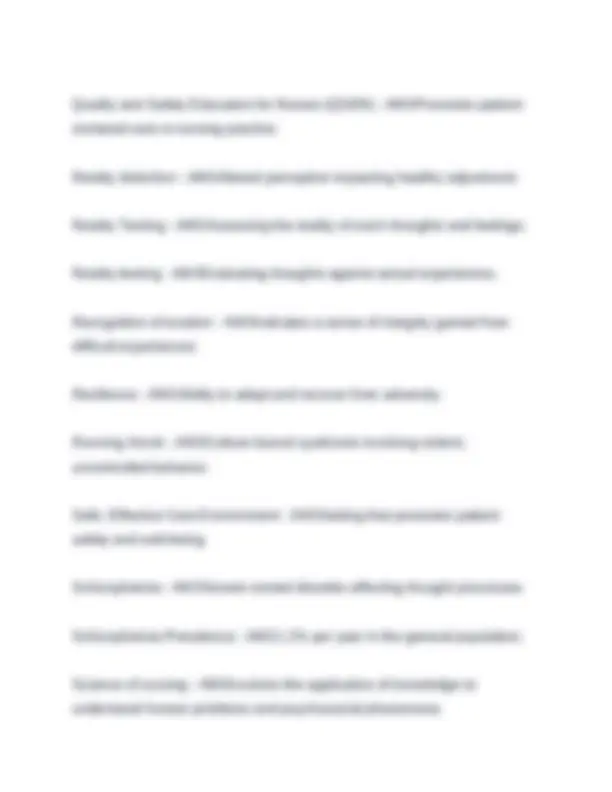
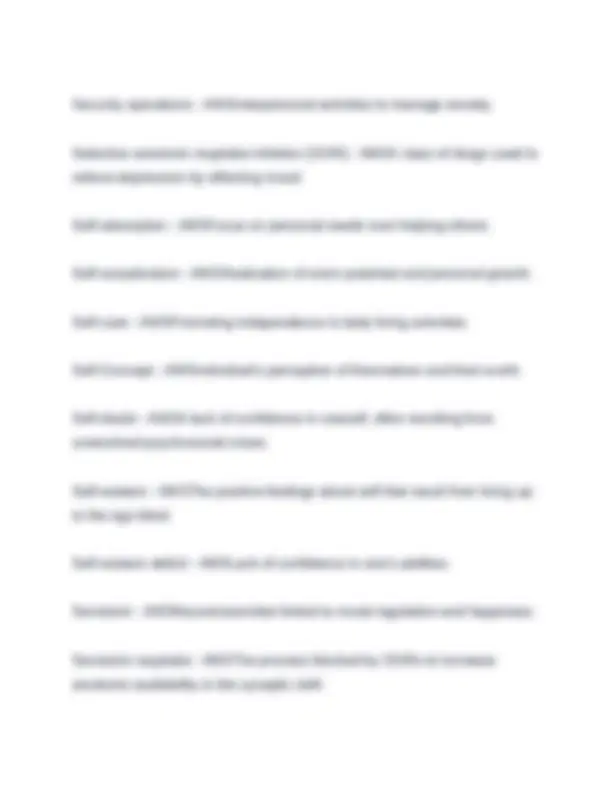
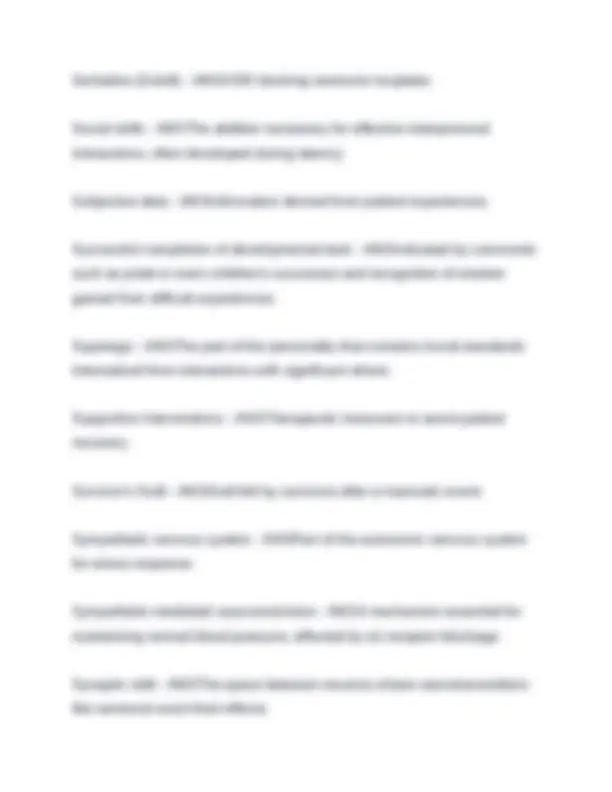
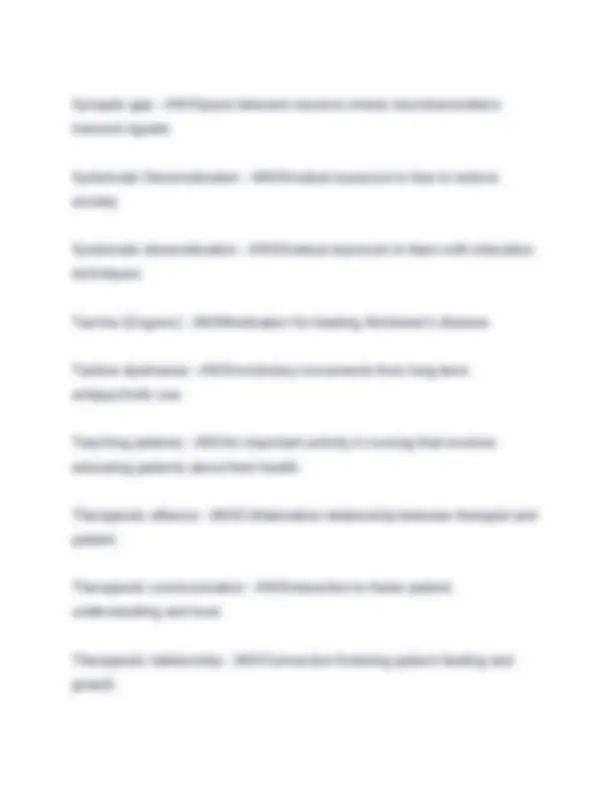
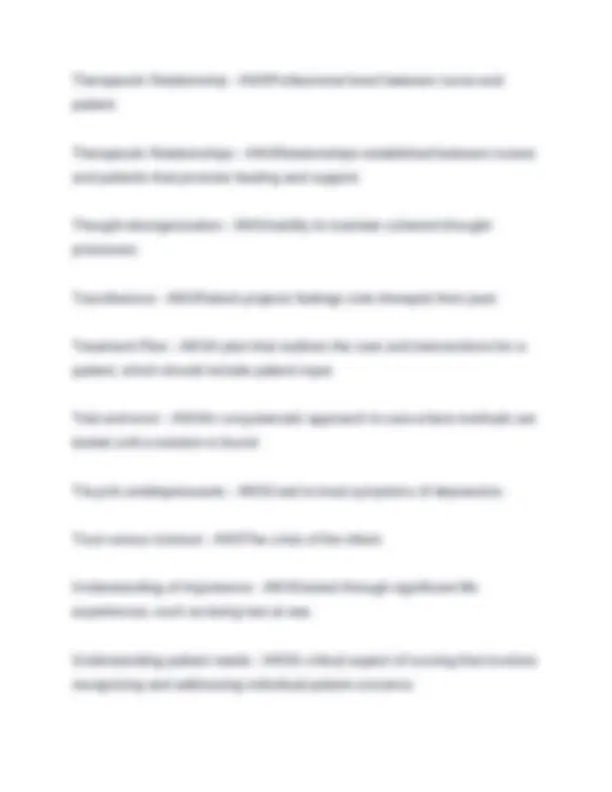
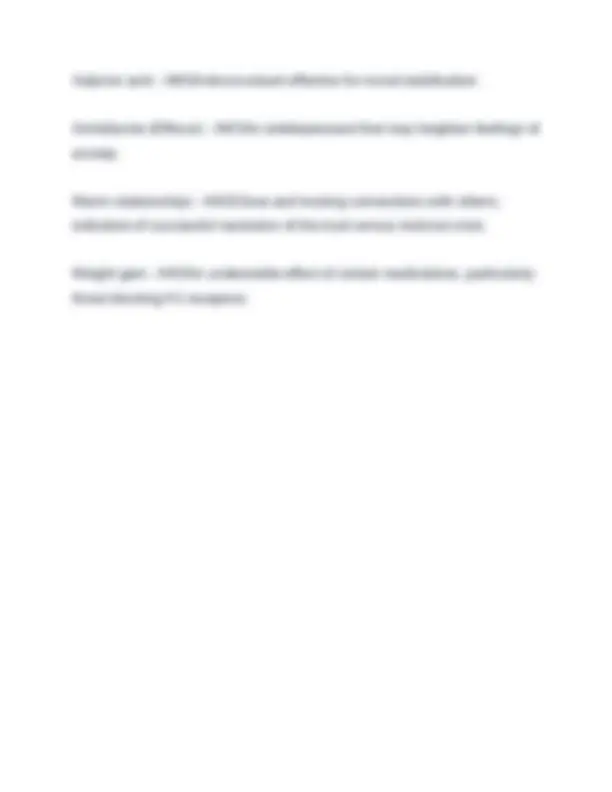


Study with the several resources on Docsity

Earn points by helping other students or get them with a premium plan


Prepare for your exams
Study with the several resources on Docsity

Earn points to download
Earn points by helping other students or get them with a premium plan
Community
Ask the community for help and clear up your study doubts
Discover the best universities in your country according to Docsity users
Free resources
Download our free guides on studying techniques, anxiety management strategies, and thesis advice from Docsity tutors
Test Bank for Psychiatric Mental Health Nursing Exam Test Bank Newest Edition 2025-2026. Questions & Correct Answers. Graded A
Typology: Exams
1 / 31

This page cannot be seen from the preview
Don't miss anything!
























Acetylcholine – ANS Neurotransmitter involved in learning and memory. Acetylcholinesterase – ANS Enzyme that breaks down acetylcholine in synapses. Advanced Practice Nurse – ANS A nurse who may conduct mental health assessments and prescribe psychotropic medication. Advocacy - ANSThe role of defending or asserting another's cause, especially when they cannot do so themselves. Agranulocytosis - ANSSerious side effect of clozapine requiring monitoring. Akathisia - ANSRestlessness caused by dopamine-blocking medications. Alzheimer's Disease Prevalence - ANS10% for ages 65+, 50% for ages 85+. Anal fixation - ANSResults in retentiveness, rigidity, or destructiveness.
Anal stage - ANSOccurs from age 1 to 3 years and has as its focus toilet training and learning to delay immediate gratification. Anticholinergic properties - ANSInhibit acetylcholine, affecting parasympathetic functions. Anticholinergic side effects - ANSInclude dry mouth, constipation, and blurred vision. Antimanic drugs - ANSMedications for treating bipolar disorder. Antipsychotic drugs - ANSUsed to treat psychosis. Antipsychotic medications - ANSDrugs used to treat schizophrenia and other mental health disorders, requiring careful monitoring. Anxiety Management - ANSStrategies to reduce anxiety symptoms in patients. Appraisal of reality - ANSAn aspect of mental health that concerns the accuracy of one's perception of reality. Art of nursing - ANSConsists of care, compassion, and advocacy to enhance patient comfort and well-being. As If - ANSA hypothetical scenario, not grounded in reality.
Behavioral Health Reference Manual - ANSResource for understanding mental health conditions. Behavioral tasks - ANSActivities designed to confront specific fears. Behaviorism Theory - ANSFocuses on observable behaviors and responses. Benzodiazepines - ANSMedications used for short-term anxiety relief. Biological Basis of Mental Disorders - ANSStrong genetic and biological influences on disorders. Biological illness - ANSCondition resulting from physiological changes. Bipolar Disorder - ANSMood disorder characterized by extreme mood swings. Bipolar Disorder Prevalence - ANS2.6% prevalence in the population. Blame and regret - ANSIndicate despair and unsuccessful resolution of developmental crises. Blurred vision - ANSAtropine-like side effect from muscarinic blockade. Brainstem - ANSControls vital functions like breathing and heart rate.
Brief psychodynamic therapy - ANSShort-term therapy for well-functioning individuals. Carbamazepine - ANSAnticonvulsant used as mood stabilizer. Care and compassion in nursing - ANSEssential components of the art of nursing that enhance patient well-being. Caring in Nursing - ANSEmpathetic understanding and competency that create a human connection and alleviate feelings of isolation. Catharsis - ANSEmotional release through discussing problems. Cerebellum - ANSBrain region for coordination and balance. Chlordiazepoxide (Librium) - ANSAnxiolytic used for anxiety disorders. Circadian rhythms - ANSBiological processes that cycle roughly every 24 hours. Classical Conditioning Theory - ANSLearning through association between stimuli. Client Needs - ANSEssential requirements for patient care and recovery. Client needs - ANSRequirements for optimal health and well-being.
Cognitive Level: Apply - ANSA level of cognitive processing that involves using knowledge in practical situations. Cognitive Level: Apply (Application) - ANSUsing knowledge in new situations. Cognitive Level: Comprehension - ANSUnderstanding the meaning of information. Cognitive Level: Create - ANSPutting elements together to form a coherent or functional whole. Cognitive Level: Evaluate - ANSMaking judgments based on criteria and standards. Cognitive Level: Understand - ANSA level of cognitive processing that involves comprehending information. Cognitive Level: Understand (Comprehension) - ANSRefers to the ability to grasp the meaning of information. Cognitive restructuring - ANSChanging negative thought patterns to positive ones. Cognitive therapy goals - ANSIdentify and correct inaccurate cognitions.
Cognitive-Behavioral Therapy - ANSCombines cognitive and behavioral techniques for change. Community Advocacy - ANSPolitical activity and public speaking aimed at improving the human condition. Complex Communication Skills - ANSSkills required by psychiatric nurses to effectively interact with patients and address their needs. Computed tomography (CT) scan - ANSA medical imaging technique used to assess brain injuries. Constipation - ANSGastrointestinal side effect of anticholinergic drugs. Control over behavior - ANSAn aspect of mental health that refers to an individual's ability to regulate their actions. Coordination of care - ANSOrganizing patient care activities and sharing information among all participants. Coping mechanisms - ANSStrategies to manage stress and challenges. Counter-Transference - ANSTherapist's emotional response to the patient. CT scan - ANSA diagnostic procedure that shows the presence or absence of structural changes in the brain.
Developmental task of 2-year-olds - ANSStriving for independence. Developmental task of early childhood - ANSThe task of gaining control over the environment. Developmental task of infancy - ANSThe development of trust. Diabetes - ANSA condition that can be complicated by weight gain from antipsychotic medications. Diagnostic Criteria - ANSStandards used to identify specific mental disorders. Differential diagnosis - ANSThe process of distinguishing between two or more conditions that share similar signs or symptoms. Dissociative Fugue - ANSA rare psychological disorder involving memory loss. Dopamine - ANSNeurotransmitter linked to pleasure and movement regulation. Dopamine-blocking effects - ANSSide effects from medications that inhibit dopamine. Dopaminergic effect - ANSInfluences mood and movement regulation.
Dry mouth - ANSCommon side effect of anticholinergic medications. DSM-5 - ANSManual providing diagnostic criteria for mental disorders. DSM-5 diagnosis - ANSDescribes causes of disorders whereas a nursing diagnosis does not explore etiology. Effective Communication Skills - ANSEssential for building therapeutic relationships. Ego - ANSThe mediator of behavior that weighs the consequences of actions. Ego defense mechanisms - ANSUnconscious strategies to relieve anxiety. Emotional isolation - ANSInability to connect emotionally with others. Emotional regulation - ANSAbility to manage and respond to emotional experiences. Emotional relief - ANSFeeling better after sharing burdensome thoughts. Emotional self-control - ANSAbility to manage one's emotional responses. Emotional support in nursing - ANSInvolves listening and providing comfort to patients during difficult times.
GABA (Gamma-aminobutyric acid) - ANSA neurotransmitter that is not significantly affected by the medications discussed. Generativity - ANSConcern for future generations and community involvement. Genetic Influence - ANSGenes contribute significantly to mental disorders. Genital stage - ANSThe psychosexual stage involving the ability to form satisfying sexual and emotional relationships. Graves disease - ANSAn autoimmune disorder that may complicate the use of antipsychotic medications. H1 receptor blockade - ANSA mechanism that results in weight gain, particularly undesirable for obese patients. Hallucinations - ANSPerceptions without external stimuli, often auditory or visual. Health promotion - ANSActivities aimed at improving health outcomes. Health Promotion and Maintenance - ANSStrategies to improve overall health and well-being. Health teaching - ANSProviding information and education to promote health and well-being.
Healthy adjustment - ANSAbility to adapt positively to life changes. Healthy self-concept - ANSAn aspect of mental health that reflects a positive perception of oneself. High Technology Monitoring - ANSUse of advanced equipment by psychiatric nurses to monitor patients' conditions. Holding a patient's hand - ANSAn act of compassion that provides comfort to frightened patients. Holistic Perspective in Nursing - ANSAn approach that considers both medical and mental health problems in patient care. Homework assignments - ANSTasks given to patients to complete between sessions. Hyperlipidemia - ANSA condition that can be exacerbated by weight gain from antipsychotic medications. Hypertensive crisis - ANSDangerous increase in blood pressure from tyramine. Hypothalamus dysfunction - ANSIndicated by excessive drinking and eating, as it regulates basic drives such as hunger and thirst.
Intense Relationships - ANSCharacterized by idealization and devaluation cycles. Internalization - ANSThe process by which individuals adopt the values and standards of others as their own. Interpersonal Psychotherapy - ANSAddresses interpersonal issues to improve functioning. Interpersonal relationship activities - ANSObservable behaviors addressing social interactions. Intuition in nursing - ANSAn intuitive sense of patients' needs that guides effective psychiatric nurses. Irrational beliefs - ANSUnfounded convictions that lead to emotional distress. Lamotrigine - ANSAnticonvulsant used for mood stabilization. Legislative Advocacy - ANSThe act of nurses writing letters to elected representatives to oppose legislation affecting mental health care. Lithium - ANSCommon mood stabilizer for bipolar disorder. Low tyramine diet - ANSNecessary for patients on MAO inhibitors.
Major depression - ANSA mood disorder characterized by persistent sadness. Maladaptive Behaviors - ANSActions that hinder personal growth or well- being. Manipulation - ANSThe act of influencing or controlling others to achieve personal goals, often seen in individuals with unresolved psychosexual issues. Maslow's hierarchy of needs - ANSFramework prioritizing physiological needs first. Medical diagnosis - ANSConcerned with the patient's disease state, causes, and cures. Memory difficulties - ANSChallenges in recalling or processing information. Memory retention strategies - ANSTechniques used to help patients remember important information, such as logging appointments. Mental Disorders - ANSConditions characterized by significant psychological distress.
Milieu Therapy - ANSTherapeutic environment to support patient recovery. Misconceptions about Psychiatric Nursing - ANSThe false belief that psychiatric nurses lose their nursing skills compared to other specialties. Mood Alteration - ANSChange in emotional state reflecting mental illness. Mood stabilizers - ANSTreat symptoms of mania in bipolar disorder. Moral standards - ANSThe ethical principles that guide behavior, often internalized from significant others. Motivational interviewing - ANSClient-centered approach to enhance motivation for change. Muscarinic receptor blockade - ANSCauses dry mouth and blurred vision. NANDA - ANSNorth American Nursing Diagnosis Association for diagnoses. Negative behavior - ANSBehavior that is defiant or oppositional, often seen in young children. Neuroimaging - ANSTechniques to visualize brain structure and function. Neurotransmitter blockade - ANSThe action of certain medications that inhibit the function of neurotransmitters.
Neurotransmitter imbalance - ANSA condition where the levels of neurotransmitters are not functioning properly. Neurotransmitter reuptake - ANSProcess where neurotransmitters are reabsorbed after signaling. Neurotransmitter serotonin - ANSA chemical in the brain thought to be related to mood regulation and depression. Neurotransmitters - ANSNatural chemicals that pass messages between brain cells. NIC - ANSNursing Interventions Classification for nursing actions. Norepinephrine - ANSNeurotransmitter associated with fight or flight response. Nurse-Patient Ratios - ANSThe number of nurses to patients, which can affect the quality of care provided. Nursing diagnosis - ANSOffers a framework for identifying interventions for issues a patient is experiencing. Nursing implications - ANSConsiderations for patient care based on theories.